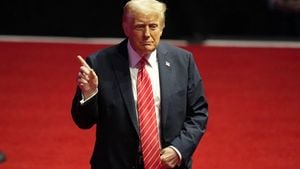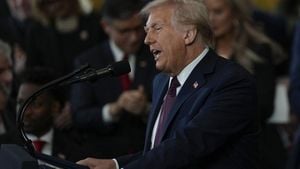Fumio Kishida, the Prime Minister of Japan, recently appointed a new Prime Minister amid the increasing turbulence within the nation's political climate. This significant political move was announced during the latest session of Japan's National Diet, as Kishida seeks to stabilize the government and address growing concerns from the public.
Delivering his address within the hallowed halls of the National Diet building located in Tokyo, Kishida acknowledged the serious challenges facing Japan. "We must work together to rebuild the trust and confidence of the people," he stated, emphasizing the need for unity during trying times, according to NHK News. The appointment of the new Prime Minister has been seen as a strategic effort to revitalize the government amid the public's increasing dissatisfaction with its handling of economic issues, especially concerning the rising cost of living and inflation.
During his address, Kishida spoke gravely about the unprecedented challenges the nation faces, expressing his commitment to swift action. "This appointment is not just about governance; it’s about revitalizing the spirit of the Japanese people," he asserted, as reported by The Japan Times. Kishida’s speech set forth his intention to restore faith among the citizenry by embarking on necessary reforms aimed at economic recovery.
The political atmosphere surrounding Kishida's announcement is charged, marked by division within the ruling Liberal Democratic Party (LDP) and growing demands for change from the public. Current surveys indicate widespread dissatisfaction with the government’s performance, underlining the urgency for effective leadership.
Critics have voiced their concerns over the slow pace of recovery from the pandemic’s economic impact, pointing out the challenges faced by lower-income families amid rising inflation. Kishida acknowledged such woes during his address, indicating awareness of the public’s struggles and pledging to tackle these issues head-on.
Further complicate matters is the fragmented political environment, with recent elections having revealed rifts within the LDP and rising support for opposition parties. This division creates hurdles for the Kishida administration, making it imperative for the appointed Prime Minister to navigate these turbulent waters effectively.
“Our nation faces unprecedented challenges, and swift action is necessary,” Kishida emphasized, illustrating his resolve to confront these challenges decisively, as reported by the Associated Press. His selection of cabinet members and alignment of political strategies will undoubtedly play pivotal roles in determining Kishida's success and the government’s overall effectiveness.
Kishida’s urgent agenda also reflects broader economic strategies, which include addressing supply chain issues and bolstering support for affected sectors. Introducing measures to stimulate growth and reinvestment is part of his multi-faceted approach to restore prosperity within Japan. His administration's immediate focus will be to instill confidence among the populace through tangible results.
Looking forward, the new Prime Minister's leadership will be tested by both internal party dynamics and external pressures from society. Increased activism and expectations from various demographic groups have placed additional weight on Kishida's shoulders. He must balance representing the interests of all constituents weighed against the practicalities of governmental policies.
Wrapping up his address, Kishida stated, "Today marks not just the beginning of new leadership but also our commitment to the revival of Japanese governance." His optimistic outlook aims to inspire hope among the populace during these challenging times, and sets the tone for future engagements between the government and its citizens.
Japan stands at a crossroads, facing significant economic and political challenges. Kishida’s appointment of the new Prime Minister introduces both uncertainty and potential for renewed vigor within Japan's political arena. The stakes are high as the nation waits to see how this new leadership will navigate the tempestuous currents of public dissatisfaction and economic pressures.



